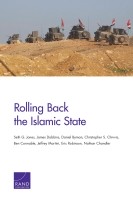| 来源类型 | Research Reports
|
| 规范类型 | 报告
|
| DOI | https://doi.org/10.7249/RR1912
|
| ISBN | 9780833097569
|
| 来源ID | RR-1912
|
| Rolling Back the Islamic State |
| Seth G. Jones; James Dobbins; Daniel Byman; Christopher S. Chivvis; Ben Connable; Jeffrey Martini; Eric Robinson; Nathan Chandler
|
| 发表日期 | 2017
|
| 出版年 | 2017
|
| 页码 | 296
|
| 语种 | 英语
|
| 结论 |
The Ultimate Goal of the Islamic State's Strategy Is to Establish a Pan-Islamic Caliphate- The Islamic State has no intention of containing itself within certain countries or regions but seeks to expand its power and influence.
- Numerous Salafi-jihadist groups across the world have pledged allegiance to the Islamic State.
While the Islamic State Has Lost Territory and Support, It Continues to Pose a Terrorist Threat to the United States and Its Allies- The Islamic State has lost considerable territory since 2014 in Iraq, Syria, Afghanistan, Egypt, Libya, and Nigeria.
- Polling data indicate declining support across the Muslim world for the Islamic State and its ideology.
- The Islamic State continues to conduct and inspire attacks around the globe.
- The group's global footprint includes eight formal provinces outside Iraq and Syria; over a dozen informal provinces; and tens of thousands of inspired individuals across Asia, the Middle East, Africa, Europe, and North America.
The United States Should Pursue a Light Rollback Strategy Against the Islamic State- The advocates of disengagement and containment argue that the Islamic State will eventually burn itself out. But the defeat of the Islamic State would be at best distant, and the group could still plot or inspire attacks.
- The employment of large numbers of American troops in ground combat would likely give rise to local resistance.
- Key components of a light rollback strategy include the use of American airpower, special operations forces, and intelligence units to enable local partners to liberate territory held by the Islamic State.
|
| 摘要 |
- Rebalance counterterrorism efforts toward governance, political, and economic steps.
- Loosen restrictions on U.S. military operations in conflict zones.
- Increase U.S. military posture in Africa.
- Tighten restrictions on Islamic State internet access.
- Adequately fund rollback operations.
|
| 主题 | Afghanistan
; Counterterrorism
; Egypt
; The Internet
; Iraq
; The Islamic State (Terrorist Organization)
; Libya
; Nigeria
; Peacekeeping and Stability Operations
; Syria
|
| URL | https://www.rand.org/pubs/research_reports/RR1912.html
|
| 来源智库 | RAND Corporation (United States)
|
| 引用统计 |
|
| 资源类型 | 智库出版物
|
| 条目标识符 | http://119.78.100.153/handle/2XGU8XDN/108468
|
推荐引用方式
GB/T 7714 |
Seth G. Jones,James Dobbins,Daniel Byman,et al. Rolling Back the Islamic State. 2017.
|
|
文件名:
|
x1495297628706.jpg
|
|
格式:
|
JPEG
|

|
文件名:
|
RAND_RR1912.pdf
|
|
格式:
|
Adobe PDF
|
除非特别说明,本系统中所有内容都受版权保护,并保留所有权利。